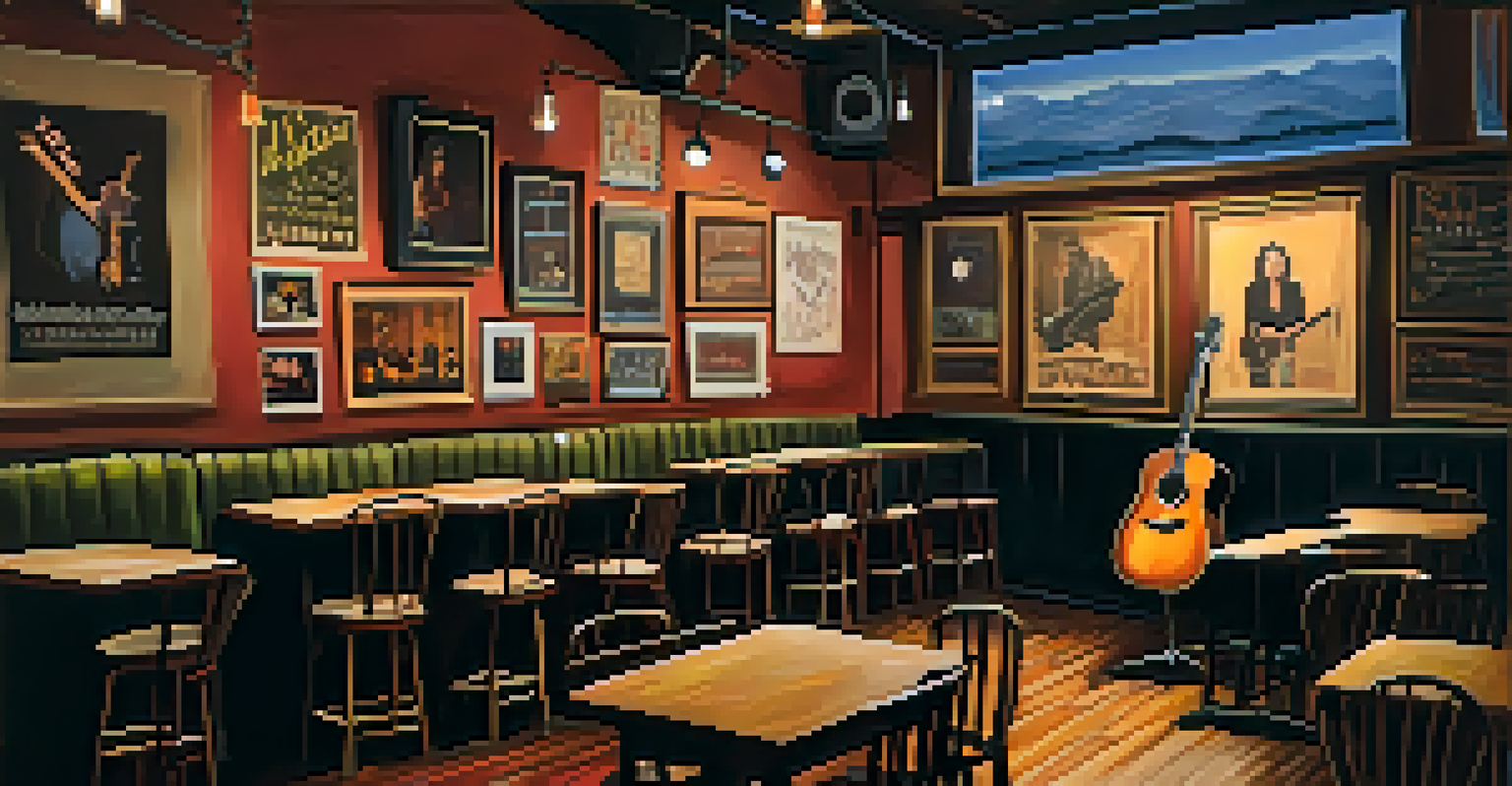Music as a Catalyst for Urban Economic Development

The Role of Music in Urban Economic Development
Music has long been recognized as a powerful tool for economic development in urban areas. It creates job opportunities in various sectors, from performance venues to recording studios. As cities invest in their music scenes, they often see a boost in tourism, as visitors flock to experience local talents and events.
Music is an outburst of the soul.
Moreover, music can stimulate local businesses, encouraging spending in restaurants, bars, and shops surrounding performance venues. This influx of activity not only generates revenue but also cultivates a vibrant community atmosphere. In essence, a thriving music scene can serve as a catalyst for broader economic revitalization.
Cities like Austin, Texas, and Nashville, Tennessee, illustrate this impact vividly. Both cities have embraced their musical identities, resulting in significant economic growth and cultural enrichment, attracting residents and tourists alike.
Music Festivals: Boosting Local Economies
Music festivals are a prime example of how sound can amplify local economies. These large-scale events attract thousands of attendees, creating a surge in demand for accommodations, food, and entertainment. For many cities, hosting a festival can mean a significant financial windfall, with local businesses seeing increased sales during the event.

Additionally, festivals often provide a platform for local artists to gain exposure, helping them to build careers while enriching the local cultural fabric. This symbiotic relationship between music and commerce effectively showcases how festivals can foster economic resilience.
Music Drives Urban Economic Growth
Cities investing in music scenes see job creation, increased tourism, and vibrant community development.
Cities like Coachella in California and Bonnaroo in Tennessee demonstrate the long-term benefits of such events. They not only generate immediate income but also enhance the cities' reputations as cultural hubs, leading to ongoing tourism and investment.
The Impact of Local Music Venues on Communities
Local music venues play a crucial role in urban economic development by serving as incubators for talent. These spaces allow musicians to perform, connect with audiences, and hone their craft, often leading to greater opportunities down the line. As artists grow, they contribute to the local economy through ticket sales, merchandise, and collaborations.
The power of music is its ability to transcend boundaries and bring people together.
Furthermore, music venues foster a sense of community by bringing people together, regardless of their background. They create a shared experience, enriching the cultural landscape and encouraging social interaction among residents. This sense of belonging can have profound effects on community well-being.
Cities that prioritize the preservation and support of local venues often see a more engaged and vibrant community. By investing in these spaces, urban areas can cultivate a rich cultural identity that attracts both residents and visitors.
Music Education as a Driver for Economic Growth
Music education plays a pivotal role in shaping future generations, and its impact on urban economic development is substantial. By providing access to music programs in schools and community centers, cities can create pathways for young talent to flourish. This investment not only nurtures creativity but also equips students with essential skills that can translate into various career opportunities.
Moreover, music education fosters discipline, teamwork, and critical thinking—traits that are highly valued in the job market. As students engage with music, they often develop a sense of purpose and belonging, which can inspire them to pursue careers in the arts or related fields.
Festivals Boost Local Economies
Music festivals generate significant revenue for local businesses and provide exposure for emerging artists.
Cities that emphasize music education often reap the benefits of a more skilled workforce. By cultivating a culture of creativity and innovation, these urban centers can attract businesses looking for talent, ultimately enhancing economic growth.
Collaboration Between Artists and Local Governments
Collaborative efforts between artists and local governments can yield significant benefits for urban economic development. When city officials recognize the value of music and the arts, they can implement policies that support creative industries. This might include funding for public art projects, grants for local musicians, or creating more performance spaces.
Such partnerships can lead to innovative solutions for urban challenges, from community engagement to economic revitalization. By bringing artists into the conversation, cities can leverage their unique perspectives and talents to enhance civic initiatives.
Examples abound, with cities like Detroit and New Orleans actively engaging artists in their planning processes. By prioritizing collaboration, these urban areas can create a more vibrant cultural landscape that ultimately drives economic growth.
The Economic Impact of Music Tourism
Music tourism—traveling to experience live music performances—has become a significant economic driver for many urban centers. Travelers often seek out destinations known for their vibrant music scenes, leading to increased spending in local hotels, restaurants, and shops. This influx of visitors can provide a much-needed boost to the economy.
Moreover, music tourism can help cities to diversify their economic bases. By attracting visitors with various interests, from festivals to live shows, cities can create a more resilient economy that is less susceptible to downturns in specific industries.
Collaboration Enhances Cultural Vitality
Partnerships between artists and local governments can foster innovative solutions for urban economic challenges.
Cities like Memphis, known for its rich musical heritage, have effectively capitalized on music tourism. By promoting their unique music culture, they can draw in visitors year-round, contributing to sustained economic growth.
Challenges and Opportunities in Music-Driven Development
While the benefits of music as a catalyst for urban economic development are clear, challenges exist. Issues such as gentrification can arise, where the influx of new residents and businesses displaces local artists and traditions. Balancing economic growth with cultural preservation is crucial for sustainable development.
Additionally, funding for music programs and venues can be inconsistent, often relying on grants or donations. Cities must be proactive in creating policies that support and sustain their music ecosystems, ensuring that artists can thrive.

Despite these challenges, opportunities abound for cities willing to embrace music as an integral part of their economic strategy. By fostering collaboration, investing in education, and prioritizing local artists, urban areas can cultivate a flourishing music scene that benefits everyone.